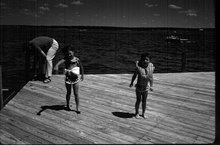
Today a pleasant breakfast with a friend. We are speaking of Andrew Wyeth and he asks me where I am from, and suddenly the entirity of that landscape fills me. I can hear and smell the wind, and want to be there badly, urgently. Life is dense here, and the mind grows heavy with so much complexity. Things are (have always been) so much simpler there, and crueler. Last time I visited my grandmother I stood out behind her house and looked out over the expanse of cottonfields. The wind whipped an anguished sound from a farmhouse a half a mile or so away. Probably a pig slaughter, though I couldn't be sure. The cruelties are dealt out in equal measure with the vast spaces, the way you cut cold butter into flour to make biscuits.
(excerpt from The Penetrable Air)
As she made her way along the furrows, big clods of dirt broke under the soles of her sneakers. Finally she reached the spot where a rusty old thresher lay beside an irrigation ditch that bubbled like a spring. There was a stock tank, and bull rushes grew all around it. Here she was shielded from view, hidden in the tall grass with the crickets and frogs and bull snakes. And she listened. She just sat still and listened to the wind, trying to identify the call of a kingbird, or meadowlark, or a prairie hawk. If she sat there long enough, the whistling breeze in her ears would begin to seem like syllables of the language of clouds, and the spaces between her own cells and the sun and the sky and the wind would disappear, until all that remained was an awareness of vast space stretching out in all directions, occasionally interrupted by a lizard or nuthatch, lighting upon her.
Sometimes she imagined that she heard her mother's voice singing songs in a language she couldn't quite understand, but she knew that the song was about how time wraps itself around and bores into things, around hearts and tongues, and children. And how, if you open your mouth you can trade your own voice for the wind, until your tongue dries out and sand fills your eyesockets and you are blind.
After a while of sitting in that wide field, singing into the wind until her voice was hoarse, the harmonic of their dual howling would begin to sound like a train tunneling through her chest, into her heart, cracking her open and splitting her wide like a watermelon. The whole sky would swoosh in and fill her, stretch her wider and wider like a balloon until her cells were diluted by air and she would rise on a current of her own sound, and the sky would become a little speck inside of her.
Hours would pass. The sun would travel across the sky, scorching her skin and the field and all creation beneath its mean heat. And the clouds would flap out in the high winds like laundry, then disappear like all the things she loved most. She thinks about her horse and the last time she had seen him being loaded up in a trailer headed for some unknown and probably tragic destination. It was her fault if he had been led in terror through the concrete canals of the slaughterhouse. And her mother and Billy, whose blood was also on her hands. Lizzie looked up at the wide sky. The geese will soon begin to gather into their ragged Vs and fly north. Would they even want her if she suddenly sprouted wings? Would anyone, ever?
The crickets started chirping then, just as the sun dipped into the mirage of water at the edge of the field. Lizzie gathered herself back into what she thought was a human presence, though she was becoming less and less sure that she was human at all. She walked slowly back toward Mama Whitlow’s house. There was a combine in the far field in a cloud of dust. Swallows were swirling in arcs around the insects it churned in its path. Lizzie could see Mama Whitlow out in the garden with a dishtowel slung over her shoulder, picking tomatoes. She walked toward this one image, of a woman she knew but did not love, involved in an activity both mindful and meaningless, and knowing that she was walking toward the one fragile understanding of what it meant to live among men. Everything Lizzie understood was in this field, or in a house miles away that had long been shut away in darkness like a dream.
As she recognized the absurdity of her life, how she belonged nowhere, she began to leap the furrows in clownish steps, trying not to step on the peaks, bounding across the lumpy, dry field. It seemed like she leaped higher and higher, as if she weighed nothing—like she was walking on the moon that had just begun to rise over the summer corn. She felt the strange sensation of blood exiting her body in little gasps, and imagined that if the red drops fell into the field, a tree might grow there, and she would guard the sapling growth from all tractors, all men, until it was tall enough for her to climb into the sky and fly away.



